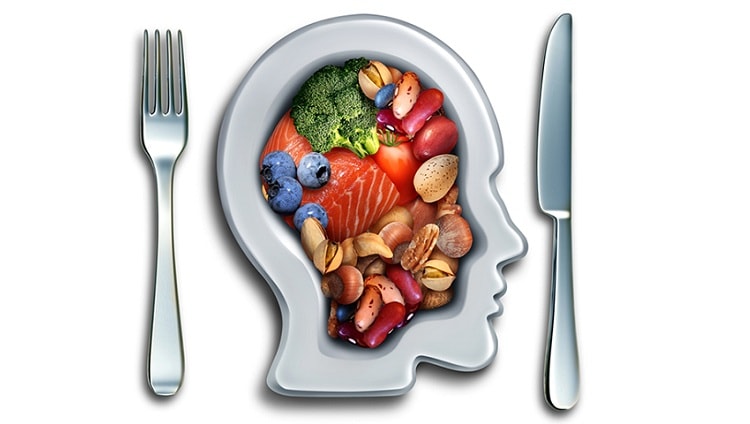Food is a basic need and a subject of contestation. What we eat is constructed and has cultural, emotional, political and economic significance. As with many other areas of health, explanations for differences in food and dietary related behaviors have revolved around whether the factors that account for these differences are individual (psychological and biological) or collective (social and cultural).1Such explanations, however, suggest that such motivating factors differ significantly amongst people with different educational and income levels.1Findings from behavioral and psychological studies indicate that food decisions are often based more on emotion than rational thought.2
Relevance to healthcare today
Globally, mental health is an area of public health that is often a low research priority and one whose impacts on human and societal well being are typically underestimated. It also is an area of public health in which disparities exist among socioeconomic groups in both access to and quality of care and treatment.3
Mental health disorders comprise a broad class of illnesses from mild disorders, such as social phobias and fear of speaking in public, to severe diseases including depression and suicidal ideation. Many mental health disorders can also lead to other chronic diseases and even death.
Anxiety and depression, often named ‘common mental disorders-CMD’ because of their high prevalence rates in the general populations, are associated with a substantial loss of quality of life for patients and their relatives, increased mortality rates, high levels of service use, and enormous economic costs.4
Major depression is currently the fourth leading cause of disease burden worldwide, and is expected to rank first in disease burden in high-income countries by the year 2030.5To date, however, there has been little consensus about what preventive strategies would be both effective and feasible to roll out to whole populations.Therefore, prevention programs can be directed:1) at an entire population (universal programs), 2)to only those at high risk (selective programs), or 3)to only those with emerging symptoms (indicated programs).4
Mental health and well-being are influenced not only by individual attributes, but also by the social circumstances in which persons find themselves and the environment in which they live; these determinants interact with each other dynamically, and may threaten or protect an individual’s mental health state.6 Risks to mental health manifest themselves at all stages in life.6Recently, psychological impacts of climate change, ranging from mild stress responses to chronic stress, have been considered among the indirect health impacts of climate change.3
 Mental health “mood disorders” and weight problems has been a focus of scientific debate for over 50 years.Many emerging scientific evidence suggests that examination of a potential relationship between mood disorders and obesity is in order, particularly for mental health professionals. Weight problems frequently complicate the treatment of mood disorders.Conversely, depressive symptoms and mood disorders are common in persons of all ages seeking treatment for weight problems and their associated medical conditions including diabetes type 2 and cardiovascular diseases.7
Mental health “mood disorders” and weight problems has been a focus of scientific debate for over 50 years.Many emerging scientific evidence suggests that examination of a potential relationship between mood disorders and obesity is in order, particularly for mental health professionals. Weight problems frequently complicate the treatment of mood disorders.Conversely, depressive symptoms and mood disorders are common in persons of all ages seeking treatment for weight problems and their associated medical conditions including diabetes type 2 and cardiovascular diseases.7
In this regard, the significant overlap between mood disorders and obesity in clinical populations may be the most important to examine. Likely, iatrogenic factors play a role. Many drugs treating CMD are associated with weight gain, whereas some drugs treating obesity-related diseases may induce mood symptoms.7
Morbidity and mortality of obesity and mood disorder:Obesity and mood disorders also share similarities with respect to general medical comorbidity. Clinical and epidemiological studies showed that general obesity, abdominal obesity, and CMD and/or major depressive disorder have each been associated with elevated morbidity and/or mortality from cardiovascular diseases, hypertension, and type 2 diabetes.7
Biology of obesity and mood disorder:No studies have directly compared the biology of obesity or its related diseases with that of a mood disorder. It is noteworthy that a number of biological systems have received fairly extensive study in both conditions. Many of these studies were limited by the fact that either mood (in the obesity studies) or weight (in the CMD studies) was not controlled for. Nonetheless, common biological abnormalities were found including: dysregulation of the hypothalamic pituitary adrenocortical-HPAC axis;dysregulation of the central serotonin, norepinephrine and dopamine neurotransmitter systems; elevated serum leptin levels and C-reactiveprotein;insulin resistance;hypertriglyceridemia; decreased HDL cholesterol;and increased intra-abdominal fat deposition.Such data have led some authorities to suggest that the metabolic syndrome and depression may be related.7
Mental health and food insecurity:The health consequences of food insecurity are therefore likely to extend beyond undernutrition.
Few studies have succeeded in disentangling the multiple pathways between food insecurity and CMD. There are at least 3 reasons why the experience of food insecurity may increase the CMD likelihood in individuals. First; individuals who experience food insecurity may have diets that lack critical micronutrients. Recent results suggest several links between micronutrient deficiencies and CMD. Second; food insecurity experience generates uncertainty and unpredictability into the lives of individuals. Uncertainty is a strong generator of stress, which has been shown to predict CMD symptoms.Finally; individuals experiencing food insecurity are sensitive to the relative well being of households in a community that may impact their global health.2,8
Mental health and Physical activity-PA:While PA can indirectly improve subjective well being and life quality by keeping chronic diseases and premature death away, there has recently been an increasing interest in its direct role in the prevention and treatment of mental health problems.
Several studies and meta-analytic reviews have summarized the potential for PA as: 1)a therapy for clinical orsubclinical CMD, and 2) means of upgrading life quality through enhanced self-esteem, improved mood states and sleep, reduced trait anxiety, and resilience to stress.9
Body image is more closely related to self-esteem than any other single element of self, particularly for females. It is often so central that it influences daily lifestyles, food choice patterns, confidence in public, and for many carries frequent emotional signals that can influence mood. Indeed, PA offers means of improving body image through fat and weight loss and improved muscle fitness.10Sufficient evidence now exists for the effectiveness of exercise in the treatment of clinical depression and in improving mental well being of the general public.9,10
Innovation and adaptability
E-mental health intervention:Food, PA and mental health have been under the spotlight in various studies and how should people be educated about their associations.Prevention programs using E-health interventions provide an opportunity to offer accessible, acceptable, easily disseminated globally low-cost interventions on a wide scale. However, the efficacy of these programs remains unclear.4Thereis inadequate evidence on the medium to long-term effect of E-interventions on the reduction of CMD incidence. Therefore, it would be useful to explore other preventive strategies in E-mental health delivery (e.g. behavioral or mindfulness approaches), particularly those that have shown good effects in face-to-face sessions.4
For instance, many adolescents do not seek help for mental health problems from professional services. The Internet is a viable alternative for the treatment of CMD among youth, particularly given their heightened familiarity with online technology.11
There are a number of potential advantages associated with internet delivered treatments, including increased access to services among those who are not willing to seek face-to-face help; lower cost to the individual and mental healthcare system; increased availability as individuals can access treatment at times and locations suited to them; increased fidelity due to automated delivery; ease of use; and the potential for rapid dissemination.11,12
However, for this potential to be realized, rigorous implementation trials need to be conducted before E-health interventions are integrated into the existing or future mental health systems.11
To date, this has been a largely neglected field of research and represents a significant opportunity for the future.Further work is needed to ascertain appropriate settings for such prevention work and to further explore the impact of E-mental health interventions.
Learn and implication
Mental health promotion and protection:There is no body of knowledge specifically directed at the interaction between diet and exercise in mental health. A better understanding of the relationships among food, PA, mental disorders, general medical illness, and the beneficial and adverse effects of psychotropic drugs on appetite, eating behavior, body weight and body image, and metabolism should improve healthcare professionals ability to treat all determinants of mood disorders.
Future studies in this realm should also employ rigorous definitions of food insecurity link to mental health by using longitudinal and mixed-methods designs with representative samples. Identifying the direction of causality is important from an applied perspective.Given the current global food crisis and the recent upsurge of interest in global mental health, such work is timely and crucial.
In short, the range of risks to mental health is wide, thus responses to them need to be multi-layered and multi-sectoral using broad and comprehensive strategies.6A benefit of incorporating findings from food psychology, food marketing and behavioral economics into a framework that can be used to explore new methods of improving individuals’ diets, lifestyles, and physical and mental health is that it broadens the public health policy options.2
Conclusion:
Food and exercise can be effective in improving the mental well being of individuals, largely through improved mood, self-perceptions and global self-esteem.Clinicians should consider the role of adjunctive nutrition interventions in their clinical practices.E-mental Health interventions provide an opportunity to offer accessible and easily disseminated low-cost interventions on a wide scale.Finally, further research into the relationship between food, PA and mental health is greatly needed.
About Dr. Sima Hamadeh
References
1- Crossley M, Khan S. Motives underlying food choice: dentists, porters and dietary health promotion. British Dental Journal, 2001; 191(4):198-202.
2- Just D, Mancino L, Wansink B. could Behavioral Economics help improve diet quality for nutrition assistance program participants? United States Department of Agriculture-Economic Research Report, 2007:34p.
3- Environmental Health Perspectives, National institute of environmental health sciences. A human health perspective on climate change. EHP Report, 2010:80p.
4- Deady M, Choi I, Calvo R, Glozier N, Christensen H, Harvey S. e-health interventions for the prevention of depression and anxiety in the general population: a systematic review and meta-analysis. BMS Psychiatry, 2017; 17:310
5- Mathers CD, Loncar D. Projections of global mortality and burden of disease from 2002 to 2030. PLoS Med. 2006;3:e442.
6- World Health Organization. Risks to mental health: An overview of vulnerabilities and risk factors. WHO report, 2012:14p.
7- Mcelroy S, Nelson E, Keck P, Nemeroff Ch. Are mood disorders and obesity related? A review for the mental health professionals. Journal of Clinical Psychiatry, 2004; 65:634-651.
8- Weaver L, Hadley C. Moving beyond hunger and nutrition: A systematic review of the evidence linking food insecurity and mental in developing countries. Ecology of Food and Nutrition, 2009; 48(4): 263-284.
9- Stathopoulou G, Powers M, Berry A, Smits J, Otto M. Exercise interventions for mental health: A quantitative and qualitative review. Clinical Psychology Science and Practice, 2006; 13(2): 179-193.
10- Fox K. The influence of physical activity on metal well-being.Public health Nutrition, 1999; 2(3a):411-418.
11- O’Dea B, Calear A, Perry Y. Is e-health the answer to gaps in adolescent mental health service provision? Current Opinion Psychiatry, 2015; 28(4):336-342.
12- O’Keeffe G, Pearson K. Clinical report -The impact of social media on children, adolescent and families. Pediatrics, 2011;127(4):799-805.























